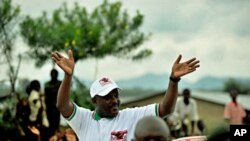As Burundi prepares for its presidential poll next week, incidents of violence and opposition boycotts have cast a cloud over hopes for democratic reform.
On Monday, June 28, Burundi will take part in the second in a summer-long series of national and local elections.
The first of these polls, to elect members for municipal councils, experienced a surprisingly large voter turnout amidst a climate of relative calm. After weeks increasing tension, the municipal elections smoothly confirmed victory for the ruling National Council for the Defense of Democracy and praised by observers from the European Union as "generally meeting international standards."
The hopes that these elections would complete a successful transition to peace and stability after the end of a 13 year civil war in 2005 have been all but dashed as Burundians prepare to elect their president.
Almost immediately after the results of the municipal polls were announced, most opposition parties, including main challenger Forces of National Liberation, cried foul, calling the results, which saw the ruling party claim over 60 percent of the vote, impossible.
Opposition parties have since withdrawn from the election, saying the upcoming poll would be rigged. Current President Pierre Nkurunziza is now guaranteed victory as the sole candidate on the ballot while fresh incidents of violence have significantly increased tension in the central African nation.
Tension and violence
The past few weeks have seen confrontations between police and the Forces of National Liberation and last week, a series of grenade attacks injured 21 in northern Burundi. Police are now reporting that a further string of blasts Tuesday have killed one and injured eight more.
While no groups have claimed responsibility for the attacks, both opposition and ruling parties have accused each other of the violence.
The tension has also affected the media, which enjoyed relative freedom before the polls. According to a spokesperson from Paris-based Reporters Without Borders, Ambroise Pierre, the government has been eager to limit press freedom in light of the election controversies.
"The coming election is making the climate for everybody more tense and for journalists more difficult because, with the election coming, the government is keen on controlling the information and controlling what is said and what is done," he said. "So obviously journalists are now being targeted whereas they were not in such a situation even one or two months ago."
According to the organization, journalists have been victims of the recent violence. One man was beaten by police outside of his home for publishing a report critical of law enforcement in Burundi. The group also said the government has utilized a private radio station, Rema FM, to manipulate news and broadcast negative reports on opposition leaders.
While opposition groups have yet to provide evidence of fraud in the previous poll, their withdrawal from the presidential election has damaged the electoral process.
Though expectations for the upcoming vote are low, the chief of the European Union election observer team, Renate Weber, expressed hope the process could be salvaged for the two legislative elections in late July.
"In any country where you see that the opposition does not want to participate any more in an electoral process, this raises concern," said Weber. "Although there will be presidential elections with only one candidate I hope that things may change for the future legislative elections in July."
Opposition groups have not yet expressed their position on the July elections, but a decision made by Burundi's electoral commission earlier this month may actually salvage some semblance of opposition participation next week.
Ballot system
Burundi's ballot system is unique in that all voters choose candidates by placing their choice in a sealed white envelope while placing all other tickets in a corresponding black envelope.
The electoral commission has decided to treat all black envelopes containing President Nkurunziza's ticket as a no vote, essentially creating a referendum on his re-election. Regardless of the outcome, opposition candidates will not be allowed to re-enter the race, but the EU's Weber believes it could bring them back into the process.
"This would be interesting for all of us, I think, to observe. I think that in this respect the opposition is quite split in the sense that some parties, specifically those which are now members of the alliance, they call for a boycott while others do not say necessarily that they advise their voters not to come," he said.
Burundi will hold its presidential elections Monday. Two legislative elections will then be held July 23 and 28, followed by village elections on September 7. If unsuccessful, the country could see a return to the violence experienced during the civil war, in which many of the current political parties fought as armed factions.




